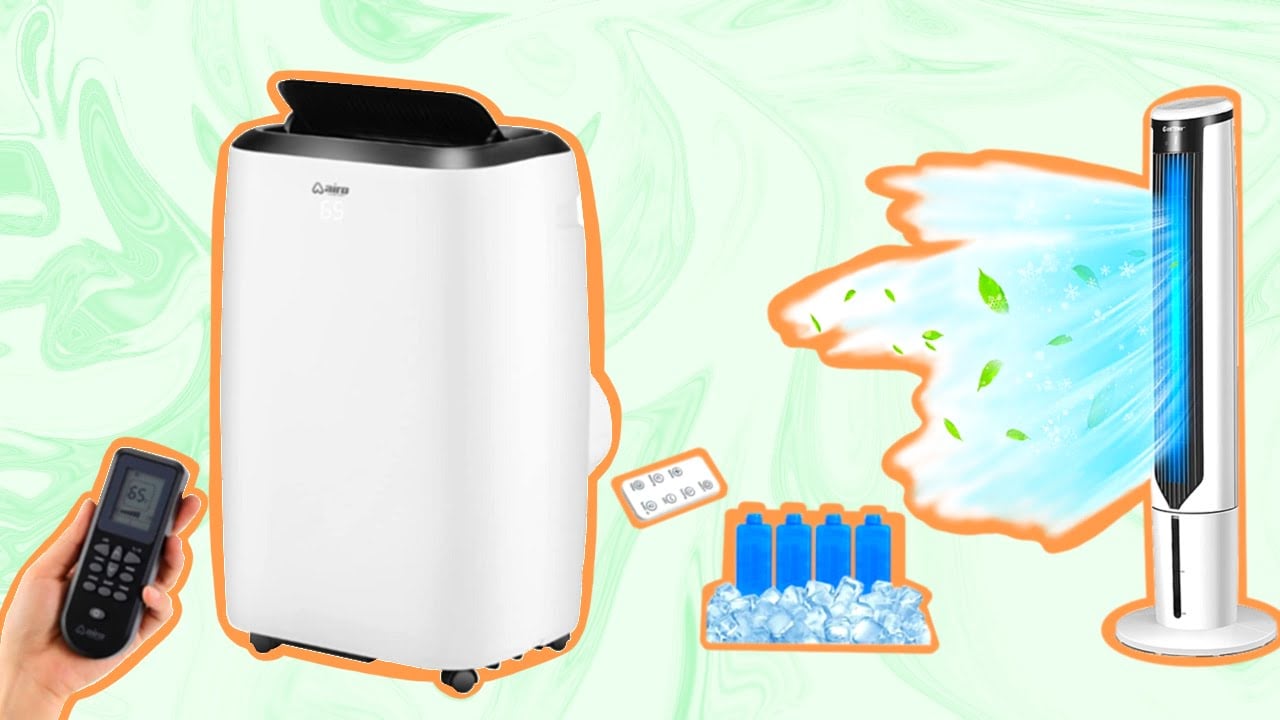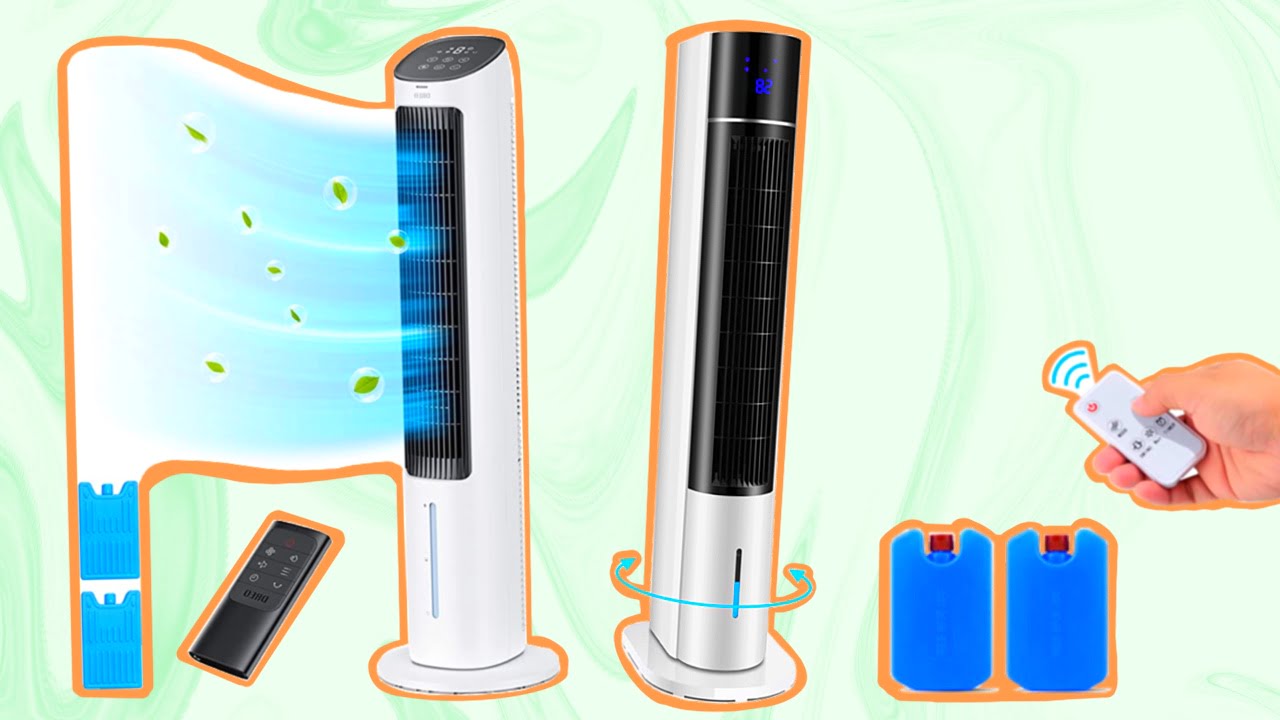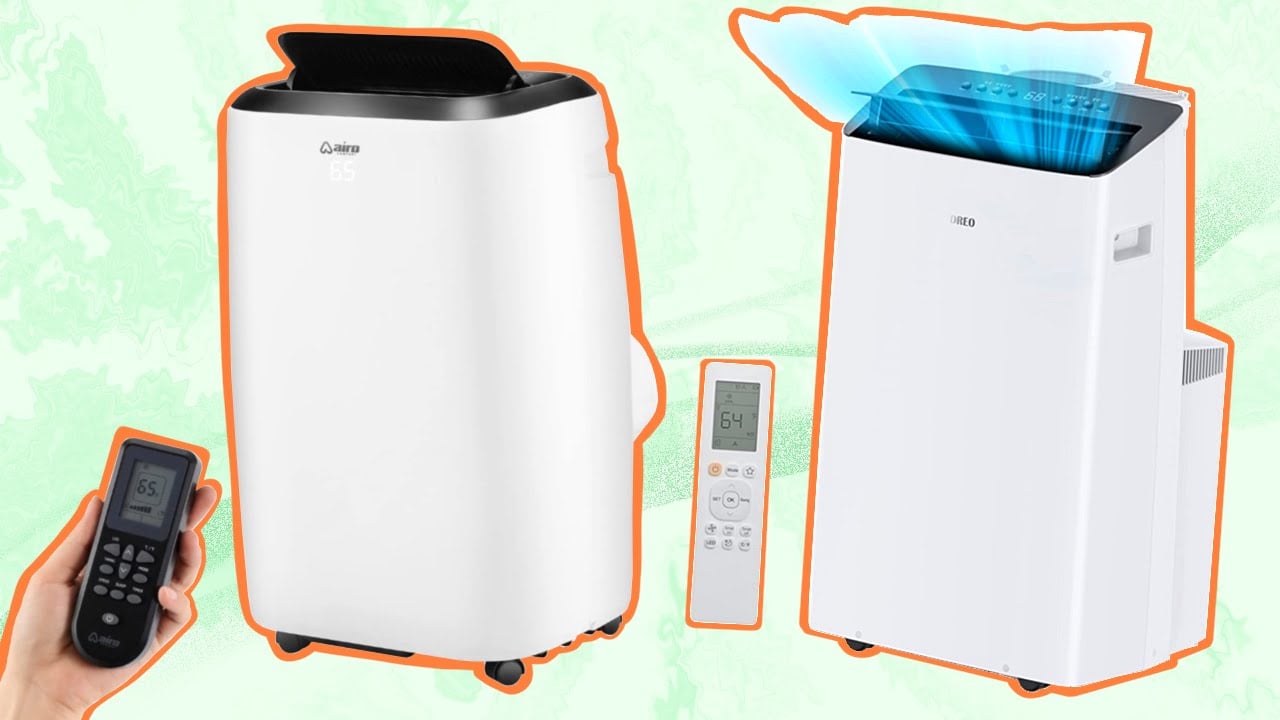Tower AC VS Portable AC | What’s Better?
While tower AC units have a higher cooling capacity to cool a large space and even larger rooms, portable ACs are known for their compactness and low electricity consumption. Both have pros and cons; however, the choice mostly depends on individual needs and budget. Most people rely on air conditioners for heating, venting, and air […]

What Are Tower Air Conditioners?
 Since the invention of air conditioners, tower ACs have been largely overshadowed by window air conditioners and split ACs. And even though they are quite the underrated AC units, they can effectively cool larger rooms at a low electric energy consumption. Similar to split ACs, they have an internal unit and an external compressor to circulate the refrigerant to the condenser.
But how does a tower air conditioner really work? Much like splits, they use refrigerants that run through a condenser coil to produce cool air and blow the air using a built-in fan. But since the internal and external units are connected via ducts in a tower air conditioner, it is difficult to move it around.
However, since it is a floor unit, you can conveniently change the angles of the grilles through which the cool breeze comes out to achieve a comfortable temperature. Besides, a tower air conditioning system is equipped with high cooling outputs, such as 2 or 4 tons.
Since the invention of air conditioners, tower ACs have been largely overshadowed by window air conditioners and split ACs. And even though they are quite the underrated AC units, they can effectively cool larger rooms at a low electric energy consumption. Similar to split ACs, they have an internal unit and an external compressor to circulate the refrigerant to the condenser.
But how does a tower air conditioner really work? Much like splits, they use refrigerants that run through a condenser coil to produce cool air and blow the air using a built-in fan. But since the internal and external units are connected via ducts in a tower air conditioner, it is difficult to move it around.
However, since it is a floor unit, you can conveniently change the angles of the grilles through which the cool breeze comes out to achieve a comfortable temperature. Besides, a tower air conditioning system is equipped with high cooling outputs, such as 2 or 4 tons.
What Are Portable Air Conditioners?
A portable air conditioner is a popular air conditioning solution for temporary cooling in home and office spaces. Unlike traditional window AC units that need to be fixed on double-hung windows, a portable unit is a freestanding appliance that you can set up anywhere in your home. Plus, portable units remain indoors entirely as they don’t have an external compressor–all one comes with is a hose and a window kit for installation. Besides being easily portable, these AC units offer various features that help maintain temperature and moisture levels even in bad weather. These include digital controls, customizable timers, carbon filters, turbo fans, and many more. Facilitated by these features, a portable AC unit takes the hot air from your home, cools it, and then circulates it. Some expensive portable air conditioners have two hoses–one pulls in fresh air from outside, and the other discards excess humidity and warm air from the room. Moreover, a portable air conditioner can benefit those with multiple rooms but aren’t keen on buying multiple split or window units. So, if you’re looking for an air conditioner for occasional use or a large portable AC that you can swing back and forth between different rooms, consider opting for a portable unit.Tower AC VS Portable AC
Now that I have highlighted some of the defining features and distinguishing traits of a tower and portable air conditioner, it’s time I delve deeper. For your benefit, I’m going to compare some key factors in both tower and portable AC units and see who has it better!1. Cooling Capacity
Tower AC Even though tower ACs are larger in size, they can maintain the room temperature in an energy-efficient way by circulating cool air throughout the room. Unlike traditional air conditioners, tower ACs have less electric energy consumption as their compact internal components circulate the air faster. Moreover, the various features a tower AC unit offers, including timers and speed settings, help you further navigate its energy efficiency abilities. Portable AC Portable air conditioners are as energy efficient as tower ACs, if not more. They work with a similar technology as a window unit, drawing hot air from the room and circulating it through chilled condenser coils. By doing so, the hot air is cooled down and blown into the space as fresh, cool air. This process is very energy efficient and can help maintain an optimal temperature in extreme weather. A portable unit also has various features to help you navigate its cooling power– from programmable timers to the digital and remote control– there’s plenty to choose from.2. Electricity Consumption
Besides checking an air conditioner’s cooling power in terms of British Thermal Units (BTU), most people are also concerned about its power consumption. Both of these factors contribute to energy bills, and knowing about them properly can give you an idea of their running costs. Tower AC Although tower air conditioners are becoming increasingly popular because of their cooling capacity, style, and functionality, they are high on power consumption. Generally speaking, tower ACs use twice as much electricity as compared to other units, such as portable and window ones. Since tower ACs generate large amounts of cold air simultaneously, they usually lead to higher costs in terms of energy bills. They place a significant electric load and consume more energy; however, tower ACs are still more energy-efficient than many other cooling solutions. If you learn to use it more judiciously, you can reduce electrical consumption and save money. Portable AC Ideal for cooling a small space like a bedroom or office room, portable air conditioners also use a significant amount of energy, depending on their BTU rating. Since a portable unit can put some strain on your home’s electrical system, you should consider installing some blow fuses or triple circuit breakers if you go for these units. However, a good trick to ensure your portable units are energy efficient is by checking the SEER and BTU ratings before purchasing. If you manage to find one with a good rating, you’ll be able to save money on energy and utility bills.3. Space Saving
Tower AC A tower AC usually has a considerable size and weight, and on top of that, it will have ducts running throughout the room, so it’s not exactly very space-saving. These ACs are usually popular for their elegant and substantial exterior, so opt for tower units if you want to show off your AC in a living space or hall. But it might not save you much floor space, given it’s installed on the floor itself. However, the best tower air conditioners are portable if the ducts connected to the units have enough leverage. Portable AC If you want space-saving features, portable air conditioners definitely top the list. They are compact and lightweight options that you can easily move to different rooms as and when needed. Its portability also saves you a lot of money, as you no longer need to buy multiple AC units–just bring the portable AC unit into the room you’re in and enjoy the fresh air! Plus, you can put it inside a storage shelf or cupboard to save floor space when not in use.4. Price
Tower AC Of course, like most household appliances, the price of tower ACs increases with more accessible features, energy efficiency, installation and placement options. What’s more, you’ll find freestanding and mounted window AC versions at different price ranges. However, despite the various benefits and options, tower units are usually more expensive than other cooling units. Such a higher price range is usually due to the advanced technology, higher cooling capacity, digital control panel, and self-cleaning programs. Portable AC Although portable air conditioners are usually more affordable than tower units, their price greatly varies depending on several important factors. The size and cooling capacity determine its price range, so larger and more powerful units will cost more than the compact ones. This is also because a larger portable air conditioner is better at controlling temperature and humidity. Other factors like the brand, design, special features, and accessibility contribute to different price tags, so it’s best to do your research and choose only those features you need to stay within budget.5. Maintenance
Tower AC Tower units require regular maintenance- from cleaning the air filters to checking the condenser lines–so it is a frequent, time-consuming investment. However, it is very easy to clean the filters yourself to ensure that there’s no dirt and debris build-up blocking the air path. But when it comes to checking other mechanical parts, it’s probably best to hire a professional. Moreover, checking and taking proper care of the turbo fans and valves are very important to help the tower unit function efficiently. But, keep in mind, it can be quite expensive to hire professional maintenance services all the time. Portable AC A portable air conditioner is comparatively easier to maintain on your own, mainly because the internal mechanism isn’t very hard to figure out. You just need to clean the unit inside out, replace the air filters or empty them regularly, and check the air vents, so nothing is blocking the airflow.Portable & Tower AC FAQs
Tower ACs are movable and comprise of two components – an external and internal unit. While the internal unit can be placed anywhere in the room or house, the external unit has to be fixed at a particular place outdoors. So, simply speaking, tower ACs are more movable than mini splits and window ACs, but they aren’t as dynamic as portable ones.
Both the AC units are quite similar to one another: both have two distinct units where one is installed outdoors to vent the warm refrigerant gas. However, tower ACs occupy floor space unlike mini splits that are affixed on the wall. Moreover, mini splits are usually more energy efficient, but tower ACs are preferred for their aesthetic value and movability.
Even though portable ACs are compact and easy to use, they often use more energy to cool the same square foot area compared to other units. This is because most portable ACs do not have a high energy efficiency rating or an Energy Star certification. So, if you’re looking for an AC that will keep your utility bills under budget, then consider opting for other types.
Similar to other AC units, a portable unit doesn’t have any limitations related to its running time. However, many products have shut-off mechanisms or automatic thermostats that turn off the AC when the ideal temperature has been reached to reduce energy usage. If your portable AC doesn’t have such settings, consider switching it off once the room feels comfortable.
Tower ACs have a significantly wider coverage since their air outlets blow out cold air at a 90-degree angle. This, combined with the longer height of their blower fan, helps tower ACs cover a much wider area in less time.

